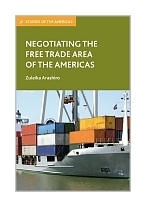|
||
• wydawnictwa polskie
• Zamów informacje o nowościach z wybranego tematu • kontakt
• Cookies na stronie |
NEGOTIANTING THE FREE TRADE AREA OF THE AMERICASARASHIRO Z.wydawnictwo: PALGRAVE MACMILLAN , rok wydania 2011, wydanie Icena netto: The first detailed historical account of the Free Trade Area of the Americas (FTAA) negotiations, this book covers the genesis of the project in the early 1990s to its demise in late 2003. It examines how the FTAA, an Inter-American policy idea, was incompatible with the predominant ideas and beliefs of Brazilian and American decision makers as to how they could and should conduct their countries' foreign trade policy in the Western Hemisphere. ZULEIKA ARASHIRO is Research and Policy Manager in the Financial Inclusion, Research and Policy Centre at the Brotherhood of St Laurence in Melbourne, Australia. Table of Contents PART I: ANALYTICAL FRAMEWORK 284 pages, Hardcover Księgarnia nie działa. Nie odpowiadamy na pytania i nie realizujemy zamówien. Do odwolania !. |


